人教版高一英语必修三Unit 1 Festivals around the world Grammar课件(42张)
文档属性
| 名称 | 人教版高一英语必修三Unit 1 Festivals around the world Grammar课件(42张) | 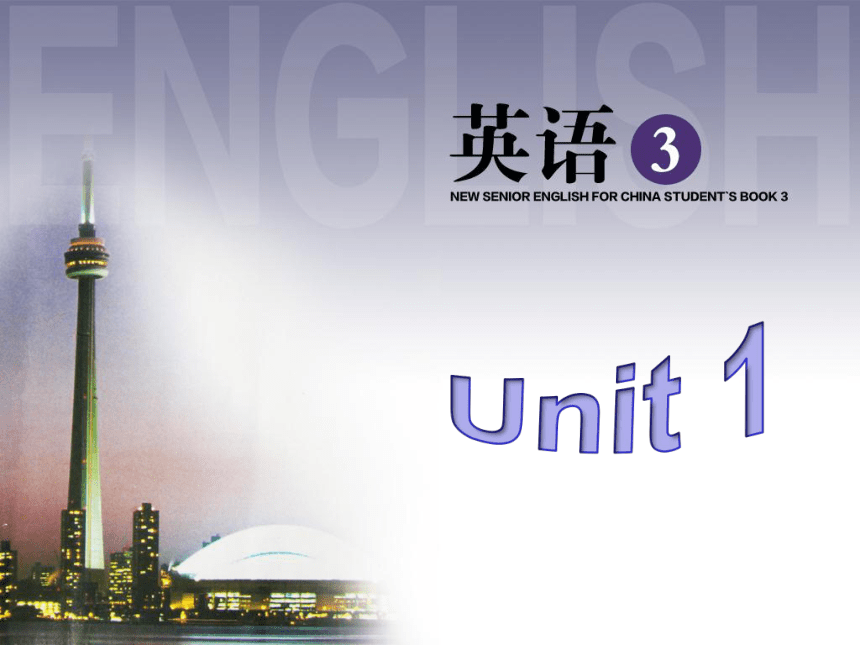 | |
| 格式 | zip | ||
| 文件大小 | 1.4MB | ||
| 资源类型 | 教案 | ||
| 版本资源 | 人教版(新课程标准) | ||
| 科目 | 英语 | ||
| 更新时间 | 2020-02-17 20:09:42 | ||
图片预览

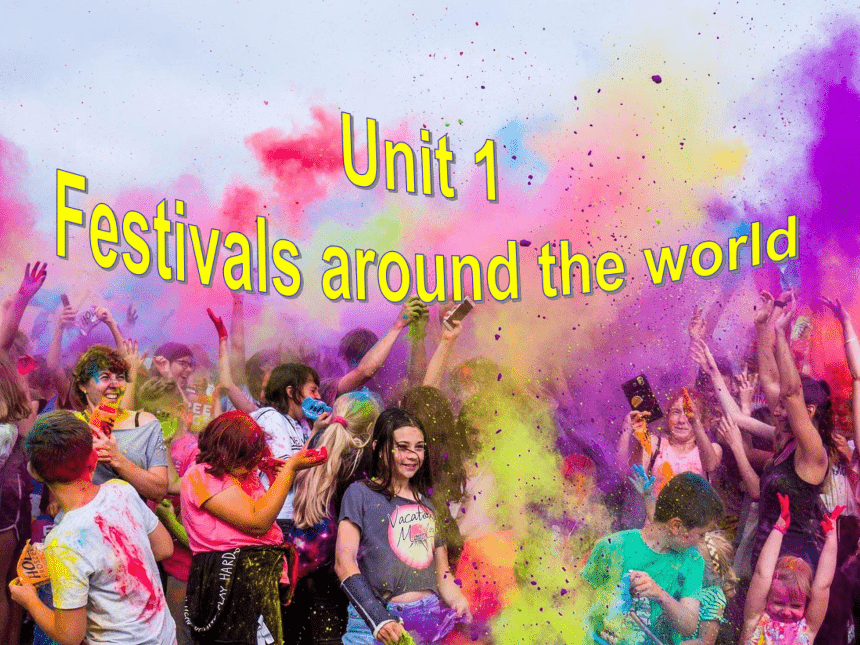

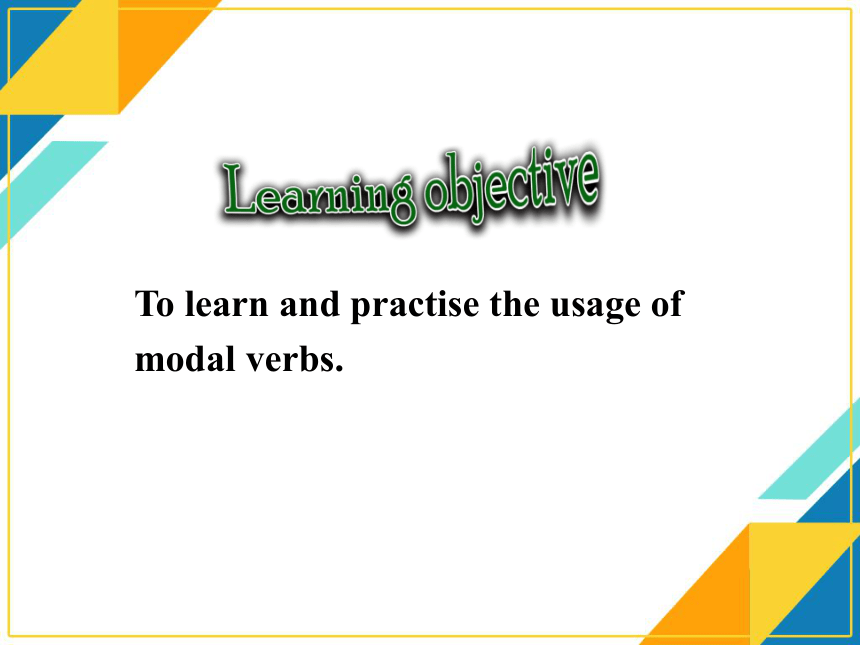
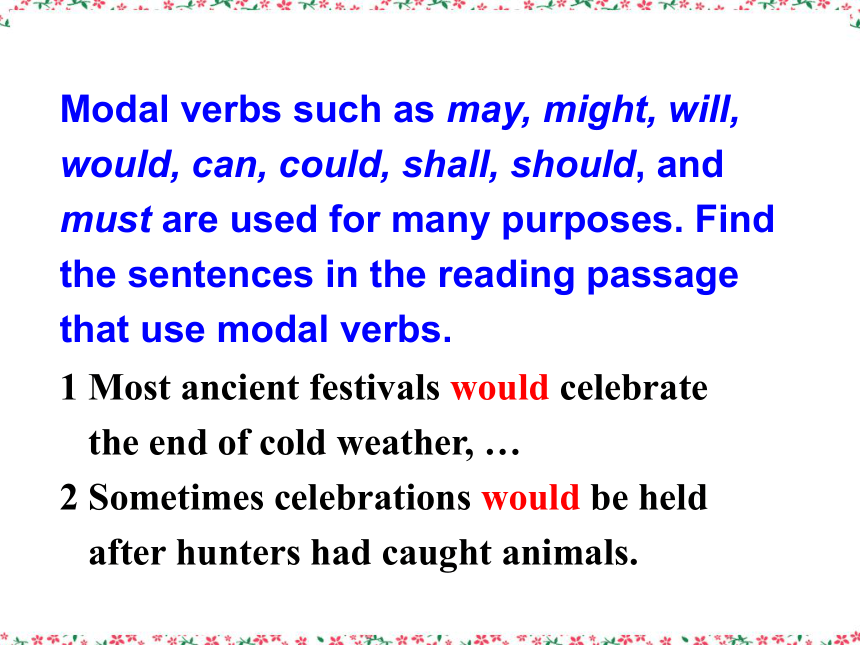
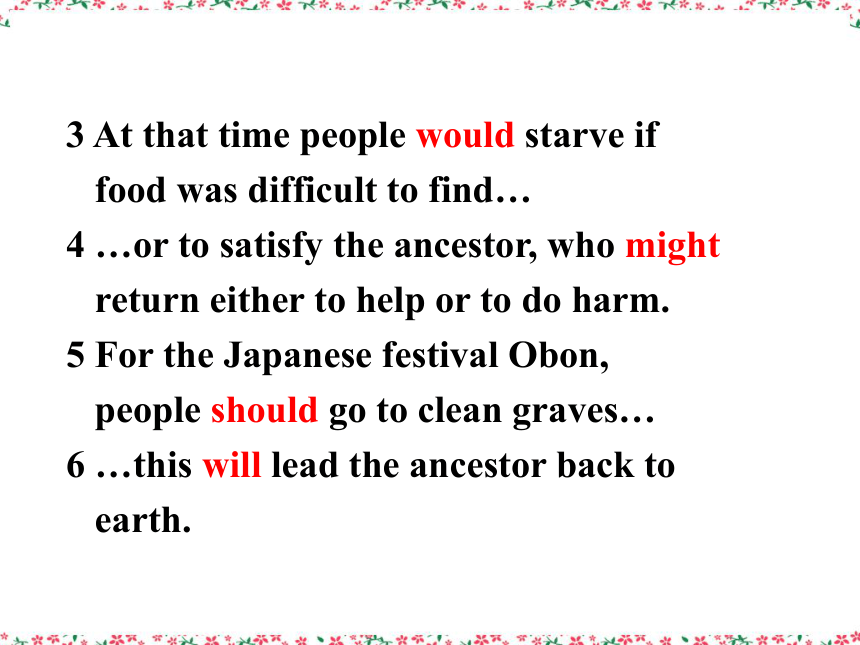
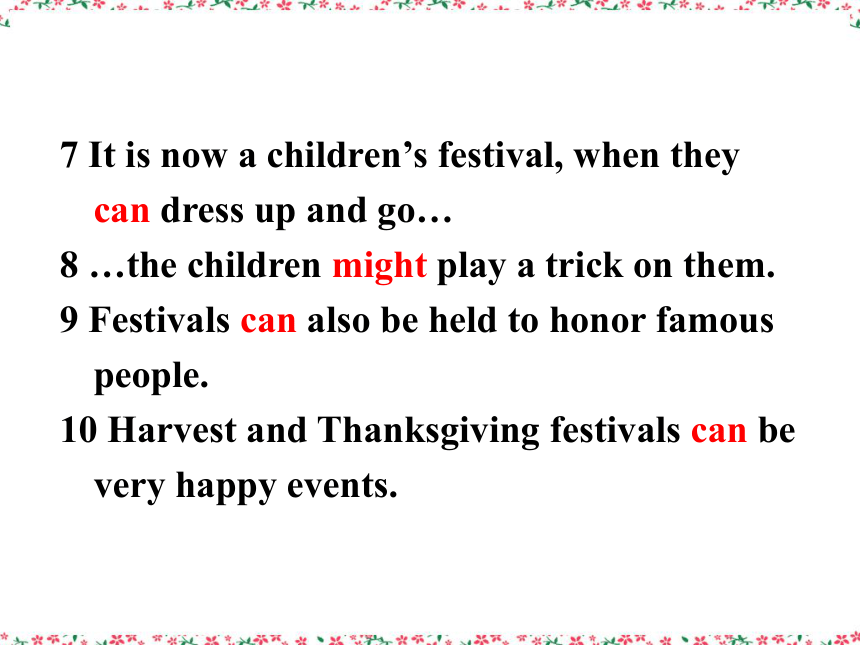
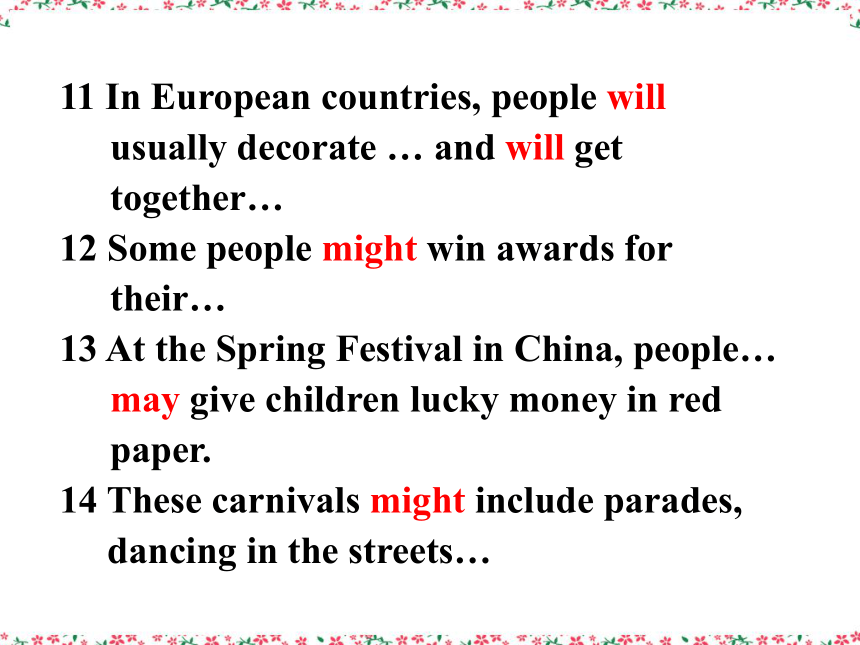

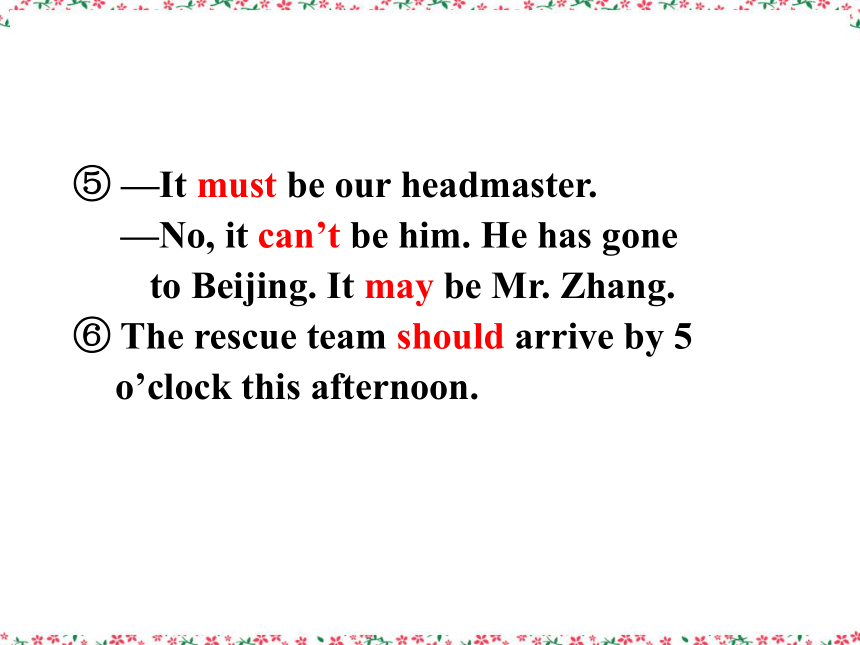
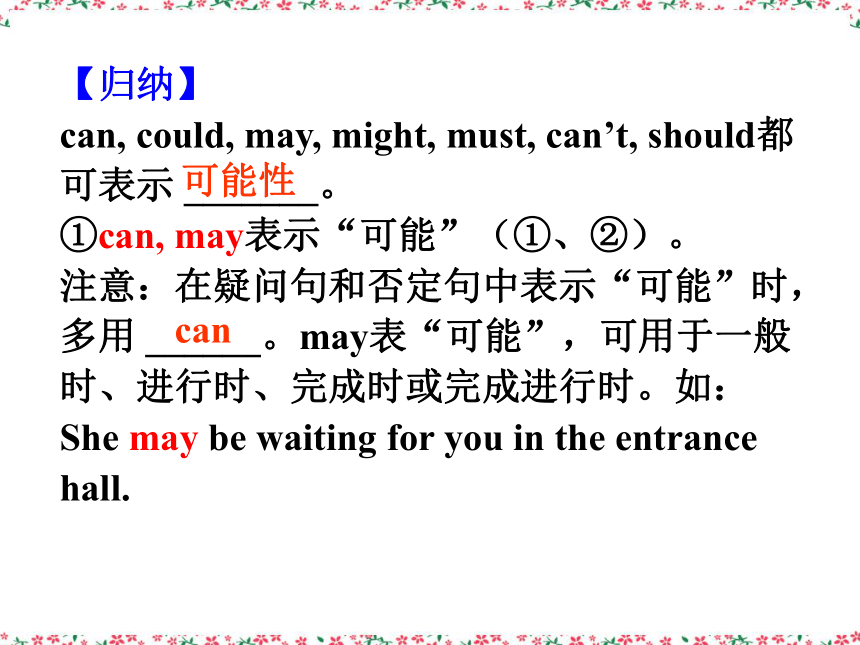
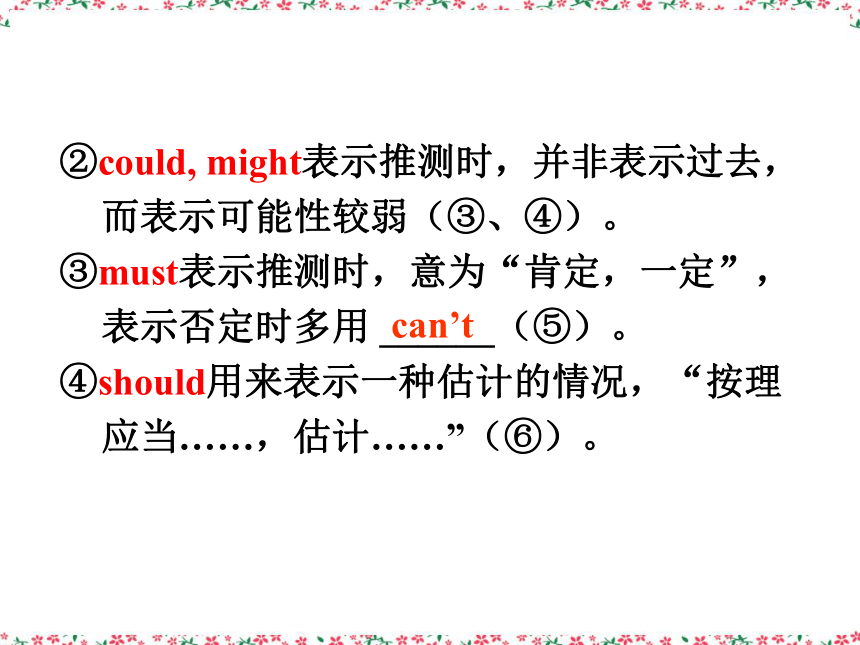
文档简介
课件42张PPT。Unit 1Unit 1
Festivals around the world情态动词To learn and practise the usage of modal verbs.Modal verbs such as may, might, will, would, can, could, shall, should, and must are used for many purposes. Find the sentences in the reading passage that use modal verbs. 1 Most ancient festivals would celebrate
the end of cold weather, …
2 Sometimes celebrations would be held
after hunters had caught animals.3 At that time people would starve if
food was difficult to find…
4 …or to satisfy the ancestor, who might
return either to help or to do harm.
5 For the Japanese festival Obon,
people should go to clean graves…
6 …this will lead the ancestor back to
earth.7 It is now a children’s festival, when they can dress up and go…
8 …the children might play a trick on them.
9 Festivals can also be held to honor famous people.
10 Harvest and Thanksgiving festivals can be very happy events.11 In European countries, people will usually decorate … and will get together…
12 Some people might win awards for their…
13 At the Spring Festival in China, people… may give children lucky money in red paper.
14 These carnivals might include parades,
dancing in the streets…【观察】
1.?① Where can Betty be?
② Anna may know Tom’s address.
③ If you’re not careful, you could get
into trouble.
④ I guess Mr. Smith might be late for work.情态动词⑤ —It must be our headmaster.
—No, it can’t be him. He has gone
to?Beijing. It may be Mr. Zhang.
⑥ The rescue team should arrive by 5 o’clock this afternoon.【归纳】
can, could, may, might, must, can’t, should都可表示 _______。
①can, may表示“可能”(①、②)。
注意:在疑问句和否定句中表示“可能”时,多用 ______。may表“可能”,可用于一般时、进行时、完成时或完成进行时。如:
She may be waiting for you in the entrance hall.可能性can②could, might表示推测时,并非表示过去,而表示可能性较弱(③、④)。
③must表示推测时,意为“肯定,一定”,表示否定时多用 ______(⑤)。
④should用来表示一种估计的情况,“按理应当……,估计……”(⑥)。can’t2.?① Lucy can speak five languages.
② He said that he could do anything we wished.
③ I haven’t been able to read that report yet.【归纳】
can表能力,指某人具有某种知识和技能而能够做到某事,指现在或将来的情况(①);
could表示过去具有某种能力(②)。
注意:当表示经过艰苦努力而成功地做到或设法做到某事时要用 ___________,而不用
________(③)。be able tocan3.?① Can / May I help you?
② May I come in?
③ Could I have a drink of water?
④ Will / Would you please send me Jack’s address?
⑤ Nobody shall throw away rubbish anywhere on the campus!【归纳】
can表示许可或请求,可与 ____ 互换使用(①);
may和might表“_____”时比can和could更正式(②),
might和could则比may和can更婉转、更有礼貌(③);will/would表示征求意见或提出请求,would此时并不表示过去,而表示委婉语气(④);
shall可以用于第二、第三人称,表示按照条约、规章等必须履行的义务(⑤)。may许可4.?① Ask, if you will, who the owner is.
② John will fall asleep in church.
③ I would often ask such questions
when I was at school.
【归纳】
will表示现在的习惯或意愿(①,②),would用于描述过去的习惯,意为“__________”(③)。过去常常5.?① Shall I open the envelope?
② You shall be punished if you break
the rules.
③ Tell her that she shall have the bike
tomorrow.
【归纳】
shall用于第一人称单复数,表示征求对方的意见或请求指点(①);shall可用于第二、三人称的陈述句中,表示
________________________(②、③)。允诺、警告、命令或威胁等6.?①We should take good care of our
children.
②I’m surprised that a person of your
intelligence should be so foolish as to
believe such lies.
【归纳】
should表义务、责任或建议、劝告(①);表示惊奇、遗憾,“________”(②)。竟然会7.?①Every citizen ought to obey the law.
②We took lunch at noon. It’s 5 o’clock.
You ought to be hungry by now.
【归纳】
ought to表示_____(①),也可表示推测(②)。义务8.?①All passengers must wear a seat belt.
②—Must I work overtime tonight?
—No, you don’t have to.
③You mustn’t move any of the books in
my bag.
【归纳】
must表示“必须”,否定式是do not have to或needn’t(②);
mustn’t表示 “_____”(③)。禁止9.?①I daren’t have criticized him in the
past, but I think I dare now.
②If you dare swim across the English
Channel, you would be our school
hero.
【归纳】
dare表示“____”,可用于完成体(①),也可用于虚拟语气中(②)。敢10.?①The plant is dead. I should / ought to have given it more water.
②The car and the van collided head-on in thick fog. Both drivers could have been seriously hurt in the accident.
③The weather here is very warm. We needn’t have packed these woolen sweaters.【归纳】
情态动词+ have done结构常用来表示过去的情况。
should / ought to have done _____________________________(①)could have done过去有可能发生,但实际并没有发生(②)
needn’t have done过去不必做某事而实际上已经做了(③) 本应该做某事,而实际上没有做Read the sentences below and discuss with a partner how each of these modal verbs is being used in the situations. Use the suggestions in the box to help you. Some may have more than one answer.ability, advice, agreement, guessing, past habit, necessity, permission, possibility, prediction, promise, request1. can and could
Jim isn’t very good at maths or science, but he can speak English very well.
Our history test was so long last week that no one could finish it.
It was the last day of school, but the teacher said that we could not leave early.abilityabilitypermissionThe hunters have been lost for days. They could starve.
Could you please show me the way to Beihai Park? possibilityrequest2. may and might
What award did you get for the sports competition? May I have a look?
Our football team didn’t play very well today, but we might do better tomorrow.possibilitypermission/ request3. will and would
During the Spring Festival time the whole family will come for dinner.
My uncle was poor but liked fashion, so he would often dress up as a rich man.
Are you free this Saturday? Would you like to join my family for dinner?promise/ predictionpast habitrequest4. shall and should
The harvest festival begins on Saturday. We shall be there with our friends.
When going by plane, you should arrive at the airport at least one hour early.
It’s nearly time for class to start. The teacher should be here soon.promiseadviceprediction5. must and can’t
When you eat fish you must be careful with the bones.
Wang Feng has won the English competition three times. He must be very smart.
A man landed on Mars? You must be joking. That can’t be true.advice/ necessityguessingguessing1. The professor warned the students that on no account _______ use mobile phones in his class. (2019天津)
A. should they B. they should
C. dare they D. they dareA 2. I can’t find my purse. I ________ it in the supermarket yesterday, but I’m not sure. (2018天津)
A. should leave B. must have left
C. might leave D. could have leftD 3. In?today’s?information?age,?the?loss?of?data _________?cause?serious?problems?for a company. (2018北京)
A.?need?????? ?B.?should????????
C.?can??????? ?D.?mustC 4. Samuel,?the?tallest?boy?in?our?class,?______?easily?reach?the?books on?the?top?shelf. (2017北京)
A.?must????????B.?should????????
C.?can???????? D.?need?C 从括号内选择合适的内容填空。
1. I went to the doctor’s yesterday, I had to wait for half an hour before he ________ (can / could) see me.
2. When young, Emma ________ (would / might) get up at six every day.
3. You ________ (would / should) pay more attention to your spelling next time.
4. Frank ________ (may / can) come with us tonight, but he isn’t really sure yet.couldwouldshouldmay5. —I heard they went skiing in the mountains last winter.
—It ________ (mustn’t / couldn’t) be true because there was little snow there.
6. Mr. Bush is on time for everything. How ________ (can / should) it be that he was late for the ceremony?
7. I thought you ________ (could / might) like something to read, so I have brought you some books.couldn’tmightcan选用括号内合适的内容补全下面短文。
Celebrity culture has spread in almost all sectors of society. It is no longer restricted to film stars and singers. However, only a small number of people 1. ________ (can, must) achieve celebrity. For those who do, the rewards 2. ________ (can, need) be huge. Watch any reality TV show and you 3. ________ (ought to, may) find competitors who dream of attaining celebrity. can?canmay?However, any fame they achieve is likely to be fleeting (转瞬即逝的) and with limited social or economic value.
In many industries, such as arts, celebrity 4. ________ (need, can) have an advantage. Many non-famous people working in the arts are likely to be relatively poorly paid even though they 5. ________ (may, ought to) be as talented as their more famous counterparts. This results in resentment (憎恨) amongst colleagues.canmay Use modal verbs to ask and answer questions based on the situations below. Try to use each modal verb at least once.1. You want to invite your friend to come to a party on Sunday.
2. You want to be a doctor, so you ask your teacher about what subjects to study.
3. You want to ask your mum for permission to go with your friends to the cinema.
Festivals around the world情态动词To learn and practise the usage of modal verbs.Modal verbs such as may, might, will, would, can, could, shall, should, and must are used for many purposes. Find the sentences in the reading passage that use modal verbs. 1 Most ancient festivals would celebrate
the end of cold weather, …
2 Sometimes celebrations would be held
after hunters had caught animals.3 At that time people would starve if
food was difficult to find…
4 …or to satisfy the ancestor, who might
return either to help or to do harm.
5 For the Japanese festival Obon,
people should go to clean graves…
6 …this will lead the ancestor back to
earth.7 It is now a children’s festival, when they can dress up and go…
8 …the children might play a trick on them.
9 Festivals can also be held to honor famous people.
10 Harvest and Thanksgiving festivals can be very happy events.11 In European countries, people will usually decorate … and will get together…
12 Some people might win awards for their…
13 At the Spring Festival in China, people… may give children lucky money in red paper.
14 These carnivals might include parades,
dancing in the streets…【观察】
1.?① Where can Betty be?
② Anna may know Tom’s address.
③ If you’re not careful, you could get
into trouble.
④ I guess Mr. Smith might be late for work.情态动词⑤ —It must be our headmaster.
—No, it can’t be him. He has gone
to?Beijing. It may be Mr. Zhang.
⑥ The rescue team should arrive by 5 o’clock this afternoon.【归纳】
can, could, may, might, must, can’t, should都可表示 _______。
①can, may表示“可能”(①、②)。
注意:在疑问句和否定句中表示“可能”时,多用 ______。may表“可能”,可用于一般时、进行时、完成时或完成进行时。如:
She may be waiting for you in the entrance hall.可能性can②could, might表示推测时,并非表示过去,而表示可能性较弱(③、④)。
③must表示推测时,意为“肯定,一定”,表示否定时多用 ______(⑤)。
④should用来表示一种估计的情况,“按理应当……,估计……”(⑥)。can’t2.?① Lucy can speak five languages.
② He said that he could do anything we wished.
③ I haven’t been able to read that report yet.【归纳】
can表能力,指某人具有某种知识和技能而能够做到某事,指现在或将来的情况(①);
could表示过去具有某种能力(②)。
注意:当表示经过艰苦努力而成功地做到或设法做到某事时要用 ___________,而不用
________(③)。be able tocan3.?① Can / May I help you?
② May I come in?
③ Could I have a drink of water?
④ Will / Would you please send me Jack’s address?
⑤ Nobody shall throw away rubbish anywhere on the campus!【归纳】
can表示许可或请求,可与 ____ 互换使用(①);
may和might表“_____”时比can和could更正式(②),
might和could则比may和can更婉转、更有礼貌(③);will/would表示征求意见或提出请求,would此时并不表示过去,而表示委婉语气(④);
shall可以用于第二、第三人称,表示按照条约、规章等必须履行的义务(⑤)。may许可4.?① Ask, if you will, who the owner is.
② John will fall asleep in church.
③ I would often ask such questions
when I was at school.
【归纳】
will表示现在的习惯或意愿(①,②),would用于描述过去的习惯,意为“__________”(③)。过去常常5.?① Shall I open the envelope?
② You shall be punished if you break
the rules.
③ Tell her that she shall have the bike
tomorrow.
【归纳】
shall用于第一人称单复数,表示征求对方的意见或请求指点(①);shall可用于第二、三人称的陈述句中,表示
________________________(②、③)。允诺、警告、命令或威胁等6.?①We should take good care of our
children.
②I’m surprised that a person of your
intelligence should be so foolish as to
believe such lies.
【归纳】
should表义务、责任或建议、劝告(①);表示惊奇、遗憾,“________”(②)。竟然会7.?①Every citizen ought to obey the law.
②We took lunch at noon. It’s 5 o’clock.
You ought to be hungry by now.
【归纳】
ought to表示_____(①),也可表示推测(②)。义务8.?①All passengers must wear a seat belt.
②—Must I work overtime tonight?
—No, you don’t have to.
③You mustn’t move any of the books in
my bag.
【归纳】
must表示“必须”,否定式是do not have to或needn’t(②);
mustn’t表示 “_____”(③)。禁止9.?①I daren’t have criticized him in the
past, but I think I dare now.
②If you dare swim across the English
Channel, you would be our school
hero.
【归纳】
dare表示“____”,可用于完成体(①),也可用于虚拟语气中(②)。敢10.?①The plant is dead. I should / ought to have given it more water.
②The car and the van collided head-on in thick fog. Both drivers could have been seriously hurt in the accident.
③The weather here is very warm. We needn’t have packed these woolen sweaters.【归纳】
情态动词+ have done结构常用来表示过去的情况。
should / ought to have done _____________________________(①)could have done过去有可能发生,但实际并没有发生(②)
needn’t have done过去不必做某事而实际上已经做了(③) 本应该做某事,而实际上没有做Read the sentences below and discuss with a partner how each of these modal verbs is being used in the situations. Use the suggestions in the box to help you. Some may have more than one answer.ability, advice, agreement, guessing, past habit, necessity, permission, possibility, prediction, promise, request1. can and could
Jim isn’t very good at maths or science, but he can speak English very well.
Our history test was so long last week that no one could finish it.
It was the last day of school, but the teacher said that we could not leave early.abilityabilitypermissionThe hunters have been lost for days. They could starve.
Could you please show me the way to Beihai Park? possibilityrequest2. may and might
What award did you get for the sports competition? May I have a look?
Our football team didn’t play very well today, but we might do better tomorrow.possibilitypermission/ request3. will and would
During the Spring Festival time the whole family will come for dinner.
My uncle was poor but liked fashion, so he would often dress up as a rich man.
Are you free this Saturday? Would you like to join my family for dinner?promise/ predictionpast habitrequest4. shall and should
The harvest festival begins on Saturday. We shall be there with our friends.
When going by plane, you should arrive at the airport at least one hour early.
It’s nearly time for class to start. The teacher should be here soon.promiseadviceprediction5. must and can’t
When you eat fish you must be careful with the bones.
Wang Feng has won the English competition three times. He must be very smart.
A man landed on Mars? You must be joking. That can’t be true.advice/ necessityguessingguessing1. The professor warned the students that on no account _______ use mobile phones in his class. (2019天津)
A. should they B. they should
C. dare they D. they dareA 2. I can’t find my purse. I ________ it in the supermarket yesterday, but I’m not sure. (2018天津)
A. should leave B. must have left
C. might leave D. could have leftD 3. In?today’s?information?age,?the?loss?of?data _________?cause?serious?problems?for a company. (2018北京)
A.?need?????? ?B.?should????????
C.?can??????? ?D.?mustC 4. Samuel,?the?tallest?boy?in?our?class,?______?easily?reach?the?books on?the?top?shelf. (2017北京)
A.?must????????B.?should????????
C.?can???????? D.?need?C 从括号内选择合适的内容填空。
1. I went to the doctor’s yesterday, I had to wait for half an hour before he ________ (can / could) see me.
2. When young, Emma ________ (would / might) get up at six every day.
3. You ________ (would / should) pay more attention to your spelling next time.
4. Frank ________ (may / can) come with us tonight, but he isn’t really sure yet.couldwouldshouldmay5. —I heard they went skiing in the mountains last winter.
—It ________ (mustn’t / couldn’t) be true because there was little snow there.
6. Mr. Bush is on time for everything. How ________ (can / should) it be that he was late for the ceremony?
7. I thought you ________ (could / might) like something to read, so I have brought you some books.couldn’tmightcan选用括号内合适的内容补全下面短文。
Celebrity culture has spread in almost all sectors of society. It is no longer restricted to film stars and singers. However, only a small number of people 1. ________ (can, must) achieve celebrity. For those who do, the rewards 2. ________ (can, need) be huge. Watch any reality TV show and you 3. ________ (ought to, may) find competitors who dream of attaining celebrity. can?canmay?However, any fame they achieve is likely to be fleeting (转瞬即逝的) and with limited social or economic value.
In many industries, such as arts, celebrity 4. ________ (need, can) have an advantage. Many non-famous people working in the arts are likely to be relatively poorly paid even though they 5. ________ (may, ought to) be as talented as their more famous counterparts. This results in resentment (憎恨) amongst colleagues.canmay Use modal verbs to ask and answer questions based on the situations below. Try to use each modal verb at least once.1. You want to invite your friend to come to a party on Sunday.
2. You want to be a doctor, so you ask your teacher about what subjects to study.
3. You want to ask your mum for permission to go with your friends to the cinema.
同课章节目录
